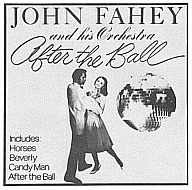John Fahey
After the Ball
After the Ball
The renowned master of guitar eclecticism emerges once again with a mellifluous musical melange, spanning decades and dramatic stylistic diversities with absolute assurance. An impeccably accomplished compendium of American music is the highly enjoyable result.
Sleeve Notes to:
After the Ball

Johnny Guitar
John Fahey, erstwhile record mogul, blues researcher, turtle connoisseur and enigma, is also not incidentally one of the most influential contemporary acoustic guitarists extant. Beginning with several obscure 78s for a label known only as Fonotone, and the storied 95-copy release of Blind Joe Death on his own Takoma label in 1959 (100 were pressed, but 5 were broken in shipment), Fahey's mastery of classical, folk and blues guitar styles and seemingly effortless virtuosity placed him immediately in the select category of guitar legends.
Lost in the South Blues
Through 13 varied years and as many albums, Fahey has maintained a constant premier position in the regard of knowledgeable guitar fanciers. The variegation of the past years stems from a wide range of pursuits, encompassing formal musicological studies at UCLA, expeditions to the South to locate lost blues artists (Skip James and Bukka White were thus rediscovered, and it's worth noting that Canned Heat came together through mutual acquaintanceship with Fahey), and the administration of the unpredictable affairs of Takoma Records.
Complex, Intrinsic Restraint
The premeir position itself, however, stems from Fahey's consummate musicianship, combined with an admirable quality of restraint which precludes pointless flauntings of instrumental vituosity, instead enabling him to evoke precise images and effects by playing each musical creation in as complex or simple a fashion as intrinsically demanded. Examples abound in After the Ball, his second Reprise album, which like its predecessor, Of River and Religion, combines acoustic guitar pieces with instrumentally augmented ventures into vintage Dixieland and other diverse musical regions.
High Humor
From the masterful fingerpicking of "When You Wore a Tulip" (sounding like a remote melodic ancestor of "Don't Think Twice") through the ukulele rhythms of "Hawaiian Two-Step" to the full Dixieland treatment accorded to "New Orleans Shuffle" and the contemporary standard "I Wish I Knew How It Felt to Be Free," the music is an evocative delight played with spirit, finesse and consummate grace. On the title track, "After the Ball," Fahey treats the listener to an agreeably antique arrangement of the first pop million-seller (in sheet music form); 1892's primordial chartbuster, like its namesake album as a whole, is a rare and fortunate blend of impressive musical accomplishment and high good humor.
John Fahey, erstwhile record mogul, blues researcher, turtle connoisseur and enigma, is also not incidentally one of the most influential contemporary acoustic guitarists extant. Beginning with several obscure 78s for a label known only as Fonotone, and the storied 95-copy release of Blind Joe Death on his own Takoma label in 1959 (100 were pressed, but 5 were broken in shipment), Fahey's mastery of classical, folk and blues guitar styles and seemingly effortless virtuosity placed him immediately in the select category of guitar legends.
Lost in the South Blues
Through 13 varied years and as many albums, Fahey has maintained a constant premier position in the regard of knowledgeable guitar fanciers. The variegation of the past years stems from a wide range of pursuits, encompassing formal musicological studies at UCLA, expeditions to the South to locate lost blues artists (Skip James and Bukka White were thus rediscovered, and it's worth noting that Canned Heat came together through mutual acquaintanceship with Fahey), and the administration of the unpredictable affairs of Takoma Records.
Complex, Intrinsic Restraint
The premeir position itself, however, stems from Fahey's consummate musicianship, combined with an admirable quality of restraint which precludes pointless flauntings of instrumental vituosity, instead enabling him to evoke precise images and effects by playing each musical creation in as complex or simple a fashion as intrinsically demanded. Examples abound in After the Ball, his second Reprise album, which like its predecessor, Of River and Religion, combines acoustic guitar pieces with instrumentally augmented ventures into vintage Dixieland and other diverse musical regions.
High Humor
From the masterful fingerpicking of "When You Wore a Tulip" (sounding like a remote melodic ancestor of "Don't Think Twice") through the ukulele rhythms of "Hawaiian Two-Step" to the full Dixieland treatment accorded to "New Orleans Shuffle" and the contemporary standard "I Wish I Knew How It Felt to Be Free," the music is an evocative delight played with spirit, finesse and consummate grace. On the title track, "After the Ball," Fahey treats the listener to an agreeably antique arrangement of the first pop million-seller (in sheet music form); 1892's primordial chartbuster, like its namesake album as a whole, is a rare and fortunate blend of impressive musical accomplishment and high good humor.